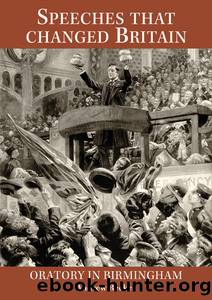Speeches That Changed Britain by Reekes Andrew;

Author:Reekes, Andrew;
Language: eng
Format: epub
Tags: HISTORY / Europe / Great Britain
ISBN: 6384887
Publisher: West Midlands History Limited
Published: 2015-09-19T00:00:00+00:00
Chamberlain had spoken before about binding the Empire more closely, but this speech drew all the strands of his evolving thinking together. His very real fear of national decline, of imperial dissolution, and of future international conflict, are here, as is an open challenge to the rigid orthodoxies of Free Trade. At this stage that challenge takes the form of imperial preference but, soon enough, other fronts against Free Trade were to be opened up, as the implications sank in. Within a fortnight he was conceding in a Commons debate that there was an inevitable corollary to colonial preference â food taxes on foreign, non-colonial produce. In a defiant tone he said: âthere, I make the honourable gentlemen opposite a present of itâ; however, he would come to rue the ceding of this gift, as he admitted to the King in September 1903.212 âThe unscrupulous use which has been made of the Big Loaf cry (the accusation was that imperial preference would inevitably mean less bread for oneâs money) has prejudiced this policy so greatly that for the moment it is politically impossible.â213
In that Commons debate he had tied tariffs to social reform; taxes could be used to fund his old pet project of Old Age Pensions. By late June he had recognised working-class indifference to this offer and promised instead that to compensate for higher bread prices, âthey may be fully relieved by a reduction of a similar amount in the cost of their tea, their sugar, their tobacco. There is no working man in the kingdom who need fear under the system I propose.â214 As the year advanced, Tariff Reform, as it became known, expanded to embrace protection for embattled farmers, and for manufacturers; it was to be, for converts, a cure for all evils, and by 1910 it was, once again, seen as a means of raising money from the foreigner (who imported to Britain) to pay for social reform, an alternative to Lloyd Georgeâs confiscatory tax plans on the rich. What it shows is that Chamberlain embarked on this campaign without thinking through all the consequences and the possibilities; it evolved as others saw its potential.
He was quick to see the logic of protecting British industry from unfair competition. Given his industrial background, formerly the dynamic director of the leading screw manufacturing business, he intuitively sympathised with manufacturers and judged the countryâs health by the success of its industries. He had little truck with those who argued that, because Britainâs invisible exports (insurance, shipping, profits and dividends from foreign investments) outweighed deficits in balance of trade in manufactured goods, consequently all was well with the economy. He conceded Britain might continue to become richer through these invisible earnings, but he worried about jobs if industry succumbed to foreign competition.215
At Bingley Hall in Birmingham on 4 November â usually remembered for his theatrical production of two identical loaves of bread which he dubbed the Big and the Little Loaves to show how exaggerated were the fears of
Download
This site does not store any files on its server. We only index and link to content provided by other sites. Please contact the content providers to delete copyright contents if any and email us, we'll remove relevant links or contents immediately.
The Vikings: Conquering England, France, and Ireland by Wernick Robert(79220)
Ali Pasha, Lion of Ioannina by Eugenia Russell & Eugenia Russell(39938)
The Vikings: Discoverers of a New World by Wernick Robert(36830)
The Conquerors (The Winning of America Series Book 3) by Eckert Allan W(36715)
Cecilia; Or, Memoirs of an Heiress — Volume 1 by Fanny Burney(32091)
Cecilia; Or, Memoirs of an Heiress — Volume 3 by Fanny Burney(31481)
Cecilia; Or, Memoirs of an Heiress — Volume 2 by Fanny Burney(31435)
Empire of the Sikhs by Patwant Singh(22779)
Hans Sturm: A Soldier's Odyssey on the Eastern Front by Gordon Williamson(18341)
The Secret History by Donna Tartt(18266)
Cat's cradle by Kurt Vonnegut(14804)
Sapiens: A Brief History of Humankind by Yuval Noah Harari(14006)
Pimp by Iceberg Slim(13828)
Talking to Strangers by Malcolm Gladwell(12915)
Norse Mythology by Gaiman Neil(12878)
Leonardo da Vinci by Walter Isaacson(12832)
Underground: A Human History of the Worlds Beneath Our Feet by Will Hunt(11857)
4 3 2 1: A Novel by Paul Auster(11842)
The Radium Girls by Kate Moore(11650)
